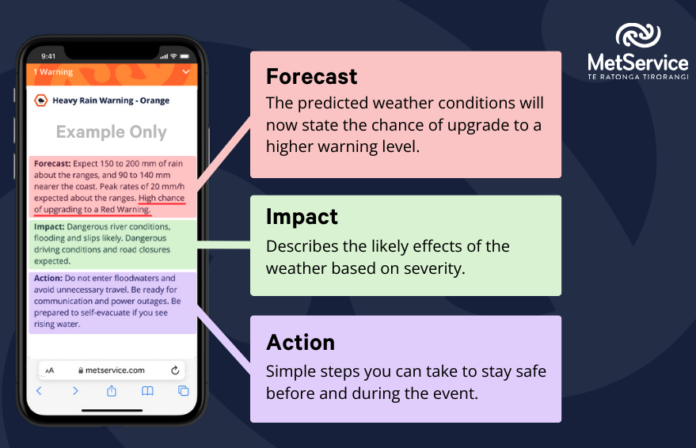From today, MetService will provide additional information in its severe weather warnings to help people better understand the impact of incoming weather and what actions to take to stay safe.
The partnership draws on the National Emergency Management Agency (NEMA)’s advice and expertise on how to respond to and prepare for emergencies and the real time insights about impending severe weather from the team of expert forecasters at MetService.
“We have always had a close working relationship with the emergency management community. This initiative further aligns our advice when impactful weather such as heavy rain, strong wind or heavy snow is on its way,” said MetService Severe Weather Manager, William Nepe.
“We know that extreme weather will continue to strike New Zealand, and in the last two years we’ve seen just how destructive it can be.
“We hope that by providing practical advice people will feel empowered to act and be weather ready.”
NEMA’s Director Civil Defence Emergency Management John Price said adding preparedness advice to severe weather information provides the public with the information they need in one place.
“MetService is the official provider of severe weather information, and their popular website and app are a trusted source of information. NEMA is the government lead for emergency management, empowering people and communities before, during and after emergencies,” he said.
“We encourage everyone to heed the advice we’re jointly providing. It is tailored for different types of weather and severity, for example clearing drains and gutters in preparation of heavy rain, staying out of floodwaters, and securing items that can be picked up by strong winds.”
In addition to action advice, MetService Warnings will also now include impact statements to help people better understand the effects a particular level of rain, wind or snow can cause.
“Combined, these impact and action statements will give people a real sense of just how severe the forecast weather could be. Whether it could be life threatening, what disruptions it may cause such as to power or transport networks, or what damage may result such as to trees or powerlines and slips,” says Mr Nepe.
Another feature has also been added – the chance that a Watch or Orange Warning will be upgraded to a higher level of severity.
“This lets people know the likelihood (high, moderate, low, or minimal) that the weather could become more severe or that a higher-level warning will follow. This will provide more reason to keep up to date with the forecast,” he said.



